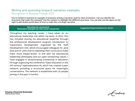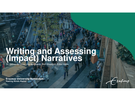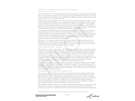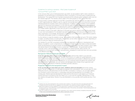Good practice: writing and assessing impact narratives
- Apr 2023
- Claartje Chajes
- ·
- Modified Dec 2024
- 5
- 2
- 1773
In this R&R-festival '23 workshop, team members of the Evaluating Societal Impact at Erasmus University Rotterdam (EUR) have shared their national and international experiences in developing guidelines and tools for writing and assessing impact narratives. Attendees were invited to share their own experiences and resources, and had the opportunity to reflect on challenges and opportunities of adopting impact narratives in the context of Recognition & Rewards.
See the comments for the report and please check the attachments!
Led by: Dr. Stefan de Jong, Assistant Professor, Department of Public Administration and Sociology, Erasmus University Rotterdam; Dr Giovanna Lima, Impact Project Officer, Evaluating Societal Impact project, Erasmus University Rotterdam; Lisa Burghardt, Junior Researcher, Evaluating Societal Impact project, Erasmus University Rotterdam; Erika Hajdu, Design Researcher, Evaluating Societal Impact project, Erasmus University Rotterdam & @bartwesstein, Strategy Trainee, Evaluating Societal Impact project, Erasmus University Rotterdam





Comments
Here you can read a summary from this workshop (with thanks to the reporter for making it):
This workshop was organized by members of the Recognition & Rewards team and the Evaluating Societal Impact team of the Erasmus University Rotterdam (EUR). We kicked off with an icebreaker in which we discussed the opportunities and challenges of adopting and working with narratives. We also looked at what resources are needed for this. It was striking that the benefits vastly outnumbered the potential challenges in the eyes of the participants. It was difficult to formulate what resources would be needed – although training was mentioned multiple times.
A short presentation on the relationship between impact and Recognition & Rewards addressed the impact definition recently adopted by EUR. After that, Giovanna talked about the Research Impact Framework which they developed at Trinity College Dublin, and can be used as a tool for writing narratives. The first plenary part ended with presenting a practical example of assessment guidelines, which were used in a pilot at the ESSB faculty of the EUR to review narratives during the yearly performance review conversations.
After this, three groups were formed in which two fictional narratives were dissected and assessed. The groups had no trouble extracting the different elements from the narrative, however, in their eyes the quality could still be increased. There is room for improvement in terms of concretizing. For instance, what was the exact role of someone in the organization of a conference? And how was the curriculum adapted through the influence of the writer of the narrative? Thus, it was sometimes difficult for evaluators to assess exactly how much impact the writer had had.
The workshop ended with a plenary discussion on what the participants had noticed, which eventually culminated in a discussion on how best to use narratives. Some participants were of the opinion that you could not ask for a complete narrative from academics every year, as this will create quite a lot of extra pressure. Another participant opted for a simplified version consisting of only one question: ‘What are you proud of and why?’ In general, however, there was a consensus that narratives added value compared to merely using quantitative indicators in the assessment of (societal) impact and could function as a conversation starter for a performance interview with a supervisor. Participants left the workshop with copies of the Researcher Impact Framework, and the EUR pilot writing and assessment guidelines.
@adriancohen, @floordriessen, @ehajdu, @soniaoliveira, @anneleinstax, @bartwesstein, we hope you enjoy reading the report and attachments of the workshop. It would be nice if you can share a take away with us!